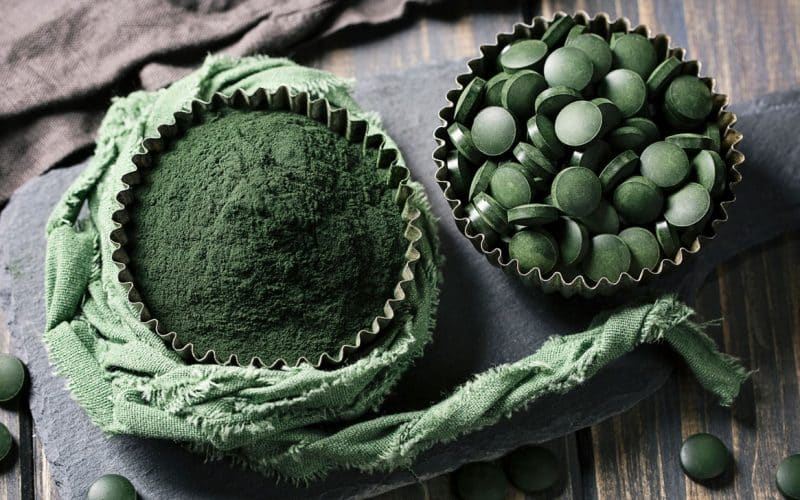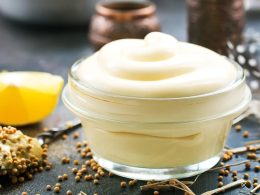Spirulina is a type of bluish-green algae that can be taken as a dietary supplement. It is considered a superfood because of its remarkable health benefits and nutritional components.
Spirulina is rich in vitamins and protein, which makes it perfect for vegetarians or vegans.
Research showed that spirulina contains inflammation-fighting and antioxidant properties. It also has the ability to help stabilize the immune system.
We are focusing on 11 health benefits and nutrition of spirulina in this article and they are as follows;
1. Weight loss
Weight loss is possible when fewer calories is being consumed. Spirulina contains low-calorie, and abundance of nutrient that are rich in just a small amount of powder. You can lose weight, while maintaining proper nutrients if you add spirulina to your diet.
It was concluded in a study conducted in 2016, of a double-blind placebo-managed trial, that spirulina may help with controlling weight.
The result showed that overweight people who were regularly fed spirulina for 3 months displayed improved body mass index (BMI).
2. Managing diabetes
Although further research is needed before it can be medically recommended, but spirulina is also considered a super agent in controlling symptoms of diabetes.
Spirulina supplementation, as noticed in a study in 2018, lowered fasting blood glucose levels. High fasting blood sugar can become a problem in individuals with diabetes type 1 and 2. It was suggested that spirulina supplements may be taken to help control diabetes in people.
These results showed that spirulina can support the management of type 2 diabetes, and that the antioxidant effect of spirulina helps in the treatment of type 1 diabetes.
An animal study in 2017, showed that spirulina can be used to manage diabetes. Mice with type 1 diabetes were orally given spirulina extract, and these were the following result;
- Their liver enzymes markers were greatly improved
- Improved insulin levels
- Reduced blood sugar
3. Helps to improve gut health
Luckily, spirulina has been naturally designed to be easily digested due to its structure of the cells.
Although more human research is required, but animal studies showed that spirulina supports gut health, especially as people age.
More study in older mice showed that spirulina also helps to preserve healthy gut bacteria as aging occurs.
Spirulina can be included to fiber-rich, gut-healthful foods in your diet since it doesn’t contain too much fiber.
4. Helps to reduce blood pressure
Spirulina surprisingly helps to lower cholesterol in the body, and there are proofs that it may also be able to control the body’s blood pressure.
It was concluded that regular consumption of spirulina for 3 months helps to reduce blood pressure even when a person is overweight and hypertensive.
5. Prevention of heart disease
Cholesterol level and high blood pressure can be associated with heart disease. Isn’t it possible that since spirulina helps to minimize the risks of both factors that it could also help prevent heart disease?
The bluish-green algae as suggested in a 2013 review may play an incredible role in the prevention of heart diseases. This could be due to their anti-inflammatory, cholesterol-lowering , and anti-oxidative properties.
6. Anti-toxic action
People are at the risk of getting poisoned from drinking contaminated water or other polluted things. This is very common in some parts of the world, and early research showed that spirulina could help in the treatment of those affected.
A study conducted in 2016 discovered anti-toxic properties in spirulina that can fight against toxins in the body, including;
- Lead
- Arsenic
- Iron
- Fluoride
- Mercury
It was also suggested by the authors of the review that spirulina could serve as medical treatment of pollutant poisoning.
7. Great nutritional profile
One way to supplement vitamins and protein is by adding spirulina in your diet, and so far, there’s been no noticeable side effects.
A tablespoon of dried spirulina powder can contain;
- 4.02 g of protein
- 1.67 g of carbohydrate
- 20 calories
- 0.54 g of fat
- 14 mg of magnesium
- 8 milligrams (mg) of calcium
- 0.7 mg of vitamin C
- 2 mg of iron
- 73 mg of sodium
- 95 mg of potassium
- 8 mg of phosphorous
Spirulina also contains riboflavin, folate, thiamin, niacin, and vitamins A, B-6, and K. Talk about a supplement that packs a punch!
8. Reduce symptoms of allergies
When a person is allergic to dust, pets, or pollen, swelling may occur inside their nose. This is referred to as rhinitis.
Fortunately, there’s some evidence that spirulina may be used to improve the symptoms of rhinitis. Not only that, spirulina can be used to relieve nasal inflammation and congestion’s.
It can also be used in reducing histamine in the body. When compared with placebo, spirulina may help to minimize symptoms of allergic rhinitis like;
- Sneezing
- Runny nose
- Itching
- Nasal congestion
9. Minimizing cholesterol
Spirulina extracts may help to lower cholesterol levels that may cause heart disease.
A 2016 meta-analysis and review suggests that spirulina supplements may positively affect blood lipids, which are fats present in blood.
It was discovered that the algae significantly helps to reduce overall cholesterol and minimize LDL – “unhealthy” – cholesterols while maximizing HDL – “healthy” – cholesterols.
This health claim was supported by a study in 2013, where researchers discovered that consuming 1 gram of spirulina per day reduces a person’s total cholesterol after 90 days.
10. Boosts overall metabolism
Spirulina can be taken to boost overall metabolism. This also helps to improve on a person’s physical energy, making it easy to burn excess calories that may help with weight loss.
A small-scale study in 2014 showed that people who consumed at least 6 grams of spirulina per day recorded improved metabolic effects, improved health quality, and controlled weight loss.
11. Helps with mental health
Spirulina has the potential to treat some mental health related issues including mood disorders.
The theory in a 2018 paper is that spirulina is a good source of tryptophan. Tryptophan is an amino acid that improves the production of serotonin, which helps in maintaining a stable mental health.
Taking spirulina supplements helps to improve certain mental health conditions in people, such as anxiety and depression by increasing and balancing their serotonin levels.
However, further clinical trials may need to be conducted before spirulina can be recommended as a support for mental health.
Risk and negative reactions associated with spirulina
Spirulina isn’t regulated by the United States Food and Drug Administration, nonetheless, a review in 2014 suggests that spirulina is tolerable by most people, and doesn’t cause any major side effects.
It is advisable to discuss drug interactions with your doctor before including spirulina into your diet.
Incorporating spirulina into your diet
Spirulina in powered form can be;
- Added to smoothies
- Added to soups
- Added to salads
- Added into fruit juices
Spirulina can also be taken as dietary supplement in tablet form. Dried spirulina and tablets can be purchased online stores or health food stores.
In summary
Initial research noted that taking spirulina may be used to improve the following:
- Gut health
- Weight loss
- Blood pressure
- Diabetes management
- Cholesterol
- Metabolic rate
- Risk of heart disease
- Symptoms of allergies
- Mental health
Further research on spirulina is needed before doctors can recommend it for health conditions.
What do you think about spirulina? Have you had any experience with the supplement? If not, is it something you’d like to try? Let us know what you think in the comments.









